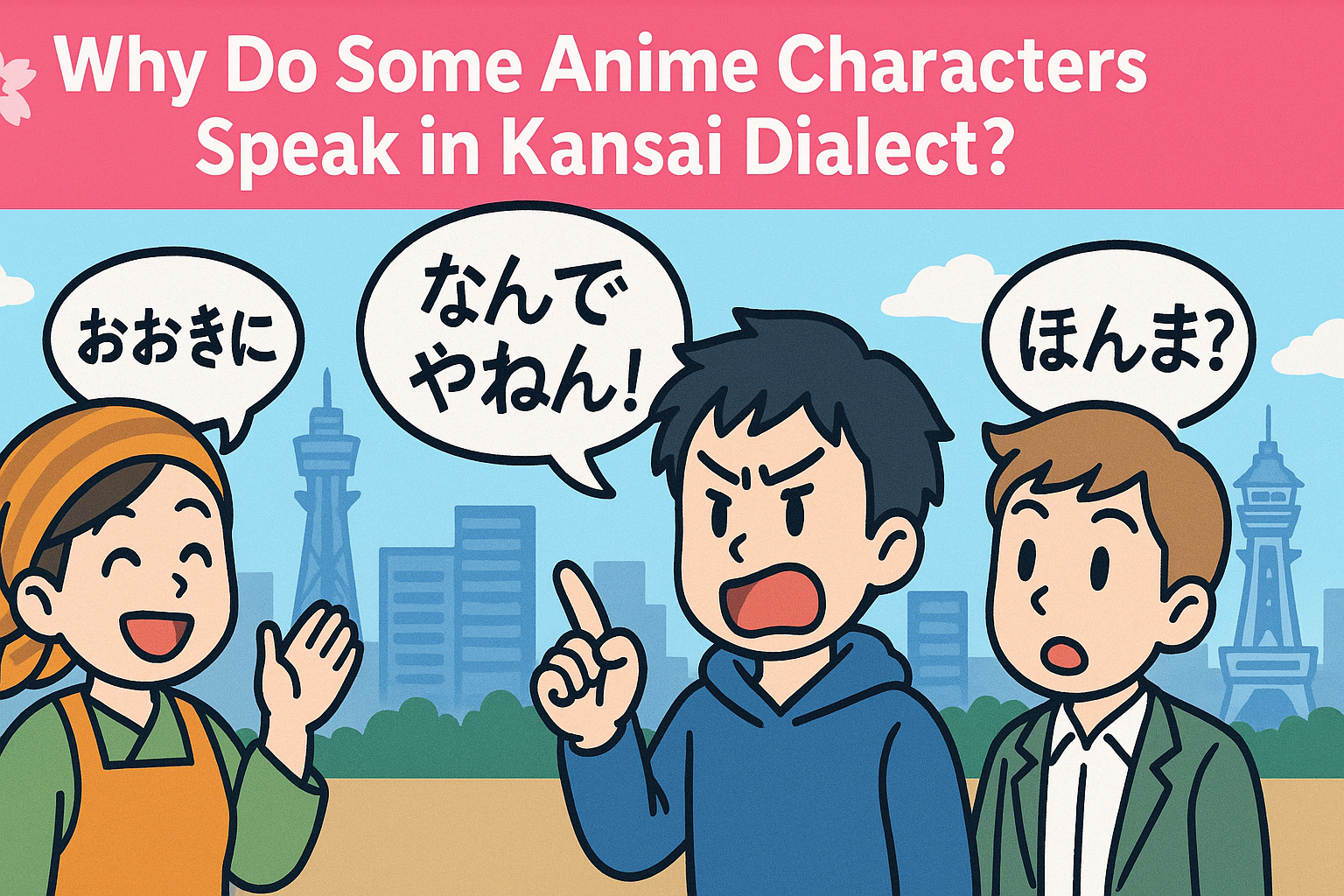
Introduction
Have you ever noticed anime characters speaking in a different, lively way—using words like “ya” instead of “da,” or “honma” instead of “hontou”? That’s Kansai-ben—the Kansai dialect, famous for its energy, humor, and unique phrases!
アニメで「なんでやねん!」や「ほんま?」と話すキャラを見たことありませんか?それは関西弁。関西出身キャラの魅力に迫ります!
What Is Kansai-ben?
Kansai-ben (関西弁) is the dialect spoken in the Kansai region of Japan—including Osaka, Kyoto, Kobe, and Nara. It’s known for being friendly, emotional, and often funny. In anime, characters who use Kansai-ben are usually portrayed as warm, outgoing, or comedic.
- Key features: different verb endings, unique vocabulary, rhythmic intonation
- Famous for the phrase: “Nandeyanen!” (What are you talking about?!/Are you kidding me?!)
Famous Kansai-ben Characters in Anime
- Kansai dialect = comedy! Many “funny” or “manzai” (comedy duo) type characters use Kansai-ben.
- Osaka (Ayumu Kasuga) (Azumanga Daioh) The “Osaka” girl—her slow, unique way of speaking is classic Kansai-ben.
- Meowth (Japanese: Nyarth) (Pokémon) In the Japanese version, Meowth speaks with a strong Kansai accent, making him sound like a streetwise comic.
- Yasuko Takasu (Toradora!) Sometimes slips into Kansai-ben, especially when emotional or joking.
- Hibari Kyouya (Katekyo Hitman Reborn!) Shows Kansai intonation and phrases during comedic scenes.
- Yamato “Matt” Ishida’s mom (Digimon Adventure) Her Kansai-ben is used for comedic effect.
Common Kansai-ben Words & Phrases
-
“Nandeyanen!”(なんでやねん!)
The most iconic phrase! Used to express surprise, disbelief, or to “punchline” a joke. -
“Honma?”(ほんま?)
Means “Really?” (Standard Japanese: “Hontou?”) -
“Wakaran” / “Wakaranai”(わからん)
Means “I don’t know.” (Standard: “Wakaranai”) -
“Ookini” (おおきに)
Means “Thank you.” Unique to Kansai, often used by merchants. -
“-ya de” / “-hen”
Verb and sentence endings unique to Kansai:- “Suki ya de!” (I like you!)
- “Ikan hen” (I’m not going.)
Why Do Anime Use Kansai-ben?
- To show a character is from Kansai (especially Osaka)
- To make them sound funnier, more relaxed, or more approachable
- For comic relief or to highlight a “manzai” duo style (straight man & funny man)
- To show warmth, friendliness, or sometimes “roughness” compared to Tokyo dialect
In Japanese comedy, the “boke” (funny guy) often speaks Kansai-ben, while the “tsukkomi” (straight man) corrects him—just like in manzai!
Sample Dialogue
Meowth (Nyarth): “Nandeyanen! That’s not how you do it, ya know!”
Osaka: “Honma ni…? I didn’t know that, na.”
Comedian character: “Ikan hen! I told you already!”
Yasuko: “Suki ya de… baka.”
Fun Facts
- Kansai-ben is often associated with comedians, so even non-Kansai characters sometimes “switch” to it for jokes!
- Osaka is known as Japan’s comedy capital. Many famous Japanese comedians are from Kansai.
- Some dialect words, like “ookini,” are almost never used in Tokyo, making them “anime-exclusive” for many viewers.
- Fans love mimicking Kansai-ben for fun, especially the phrase “nandeyanen!”
What to Watch Out For!
- Kansai-ben sounds friendly and fun in anime, but using it in real life (if you’re not from Kansai) can feel a little strange to native speakers.
- Mixing Kansai-ben and standard Japanese is common in anime, but it’s best to stick to one dialect in real conversations.
Conclusion
Kansai-ben gives anime characters a unique personality and energy. Next time you hear “nandeyanen!” or “honma?” in an anime, you’ll know you’ve met a true Kansai character!
関西弁キャラを知ると、アニメや日本語がもっと楽しくなりますよ!